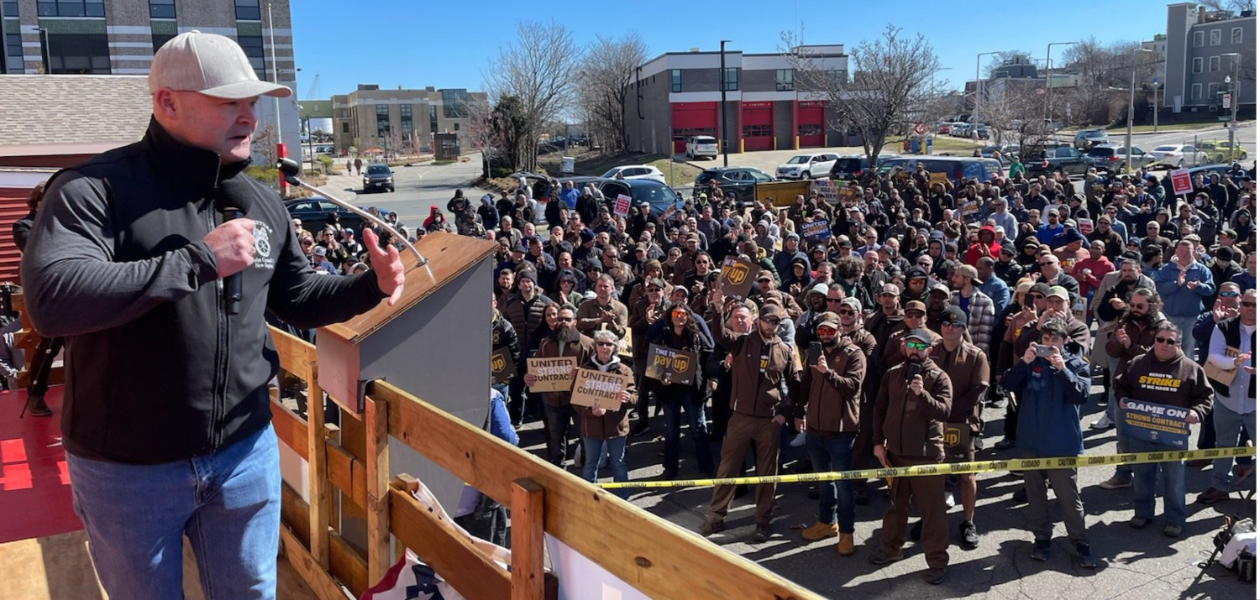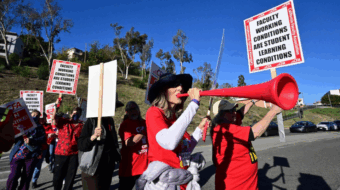
WASHINGTON—With negotiations over a new master contract about to begin, the Teamsters are warning their members to prepare for a potential forced strike at United Parcel Service.
The union’s new president, Sean O’Brien, has been touring the country ever since his inauguration, vowing to UPS Teamsters that the union would go to the mat for them on key demands, especially abolition of the two-tier wage scale. The other half of his message: Expect the company to staunchly resist.
The union has 340,000 Teamster members at UPS, one of every four Teamster members overall. It’s the largest current private-sector contract in the U.S.
The Teamsters-UPS contract is important for several reasons:
- With the hated two-tier system—one tier for part-time drivers and a higher one for full-timers—as centerpiece of the current contract, its abolition strikes a chord not just among Teamsters but among unionists nationwide.
Ending two tiers is also a goal of the Auto Workers in their coming contract talks with the Detroit 3, for example. Other bosses have imposed it on other workers, often under the guise of “merit pay,” as a divide-and-conquer tactic, for two decades.
- An aggressive stance towards UPS was a key O’Brien campaign plank when he decisively beat former President Jim Hoffa’s endorsed candidate in the 2020 one Teamster-one vote presidential race. His running mate, and now Secretary-Treasurer, Fred Zuckerman, toils in a UPS warehouse in Louisville, Ky., and heads the local there.
Using a since-deleted provision from the Teamster constitution, the then-pro-Hoffa union board imposed the last contract on its UPS members. They had voted it down, but in a low turnout. The ensuing uproar prompted Hoffa’s retirement, deletion of that provision, and fueled O’Brien’s insurgent campaign.
- O’Brien’s victory was another marker in the recent years of increased worker militancy nationwide, along with the uprising of under-paid, exploited workers in warehouses, port trucking, adjunct professorships, fast food, Starbucks, Amazon, home health care, and elsewhere.
Preparing for the opening of the talks on April 17, Teamsters UPS unionists held a large rally April 2 in Boston, headquarters of O’Brien’s home Local 25. The current contract expires July 31.
“We will set the tone for organized labor and the entire country with this contract. There is no better organization to set that bar high than the International Brotherhood of Teamsters,” O’Brien told the crowd then. “We are not going to accept and take what UPS gives us. UPS Teamsters have fire in their eyes and the intestinal fortitude to take on this company.”
“We told UPS very clearly we want a strong contract for our members, and we want it done on time. On Aug. 1, if we don’t have the contract you deserve, there will be no UPS Teamsters working,” Zuckerman warned.
The company has the money to both raise pay and create more full-time jobs, the union says. Its revenue exceeded $100 billion last year for the first time as deliveries soared due to more online consumer purchases, and it paid CEO Carol Tomé $19 million.
“UPS Teamsters have given their sweat equity to this company over the last five years and sacrificed during the pandemic. Now it’s time for UPS to pay up. There will be no concessions,” Local 25 President Tom Mari declared.
Besides eliminating the two-tier wage system, the workers also demand UPS promote more part-time drivers to full-time jobs. That was a demand in the last pact, too, and UPS failed to come through.
Creating more full-time jobs would also end forced overtime, another union goal, along with an end to corporate harassment and more protection from job safety and health hazards, notably heat-related illnesses.
In a column in Southern California Teamster, Randy Cammack, president of Los Angeles-based Joint Council 42 and Secretary-Treasurer of Local 63, seconded the message to sock money away in anticipation of a forced strike.
“We have started negotiations for the WRSA (Western Regional Supplemental Agreement) and the SWPR (Southwest Package Rider) and SWSR (Southwest Sort Rider),” he explained. The supplemental agreement is language that affects the 11 Western states, and the riders include language that affects the six Southwestern states. National negotiations begin in April.

“It is imperative members start putting money away in case we go on strike. The IBT has made it clear that if we do not have an agreement by July 31, 2023, then we will be going on strike. Business agents and stewards have been getting Contract Unity Pledge Cards signed in all the work groups and reminding members to save, save, save!
“Strikes are used as a last resort to get the company to agree at the negotiating table. The strength of that strike lies in the ability to not cross the picket line. The fight continues at the negotiating table and updates will be available throughout negotiations,” Cammack said.
The pre-bargaining update was even stronger:
“Teamsters put UPS on notice during supplemental bargaining meetings throughout the country refusing the company’s outrageous insistence on cost-neutral agreements,” it reported on the day of the big Boston rally. “While some progress was made on various proposals by the union, Teamsters also saw some disturbing backsliding by the company.”
The regional bargainers kept reminding UPS honchos of the July 31 deadline, but “UPS negotiators chose to either ignore economic proposals altogether or ask that such proposals be paid for with concessions elsewhere.
“All supplemental negotiating committees are holding firm against concessions while presenting proposals for more paid time off” in sick days and holidays, stronger seniority language, better grievance procedures and stronger anti-subcontracting provisions, among other issues.
“Supplemental negotiating committees have made it clear to the company that UPS is delusional if it thinks there will be a cost-neutral contract after it raked in more than $13 billion in profit last year thanks to the hard work of our members.”
We hope you appreciated this article. Before you go, please support great working-class and pro-people journalism by donating to People’s World.
We are not neutral. Our mission is to be a voice for truth, democracy, the environment, and socialism. We believe in people before profits. So, we take sides. Yours!
We are part of the pro-democracy media contesting the vast right-wing media propaganda ecosystem brainwashing tens of millions and putting democracy at risk.
Our journalism is free of corporate influence and paywalls because we are totally reader supported. At People’s World, we believe news and information should be free and accessible to all.
But we need your help. It takes money—a lot of it—to produce and cover unique stories you see in our pages. Only you, our readers and supporters, make this possible. If you enjoy reading People’s World and the stories we bring you, support our work by donating or becoming a monthly sustainer today.










